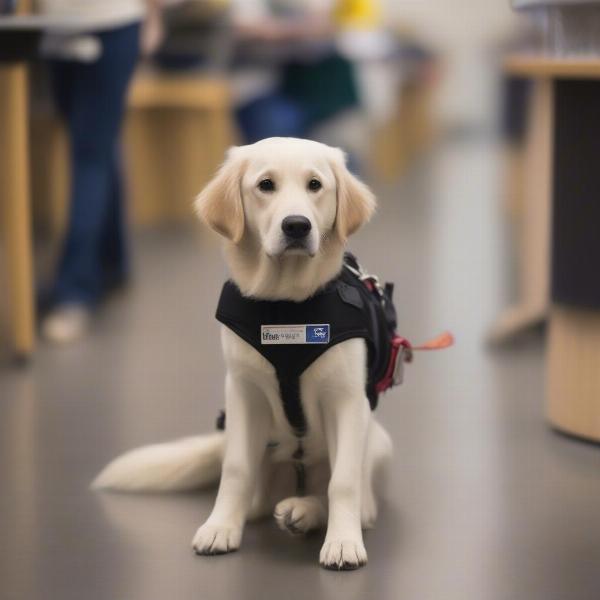Understanding the nuances of official service dog IDs can be crucial for both service dog handlers and the public. This comprehensive guide will delve into the world of official service dog identification, clarifying what constitutes legitimate identification, debunking common misconceptions, and highlighting the rights and responsibilities associated with service dogs. Having a clear understanding of “official service dog ID” is essential for navigating public spaces and ensuring a smooth experience for everyone involved.
What Exactly Constitutes an “Official” Service Dog ID?
In the United States, there’s no single, nationally recognized, government-issued “official service dog ID.” This often leads to confusion. While some organizations offer ID cards, registrations, and even vests, these are not legally required and don’t necessarily confirm a dog’s service dog status. The key lies in understanding the Americans with Disabilities Act (ADA). The ADA defines a service dog as a dog that is individually trained to do work or perform tasks for the benefit of an individual with a disability. This training is the core requirement, not any specific form of identification.
Businesses are generally only allowed to ask two questions: (1) is the dog a service animal required because of a disability? and (2) what work or task has the dog been trained to perform? They cannot ask for documentation for the dog, require the dog to demonstrate its trained task, or inquire about the nature of the person’s disability.
The Importance of Training and Public Access
A dog’s training is the true marker of its service dog status. Service dogs undergo rigorous training to perform specific tasks related to their handler’s disability. These tasks might include guiding a person who is blind, alerting someone to an impending seizure, retrieving dropped items, or providing psychiatric support. This dedicated training distinguishes service dogs from emotional support animals (ESAs) or therapy dogs, which, while providing valuable companionship and emotional support, do not have the same public access rights.
 Service Dog in Training
Service Dog in Training
Debunking Myths Surrounding Service Dog Registration
Numerous online registries claim to offer “official” service dog certification. However, these registries are often unregulated and hold no legal weight under the ADA. Paying for registration or a vest does not magically transform a dog into a service dog. Legitimate service dog organizations focus on training, not registration. Relying on such registries can create misunderstandings and potentially jeopardize the legitimate access rights of genuine service dog teams.
Navigating Public Spaces with Your Service Dog
While no official ID is required, carrying identification, such as a doctor’s note or training documentation, can sometimes be helpful in clarifying your dog’s status. A well-behaved service dog wearing a vest can also help streamline interactions in public spaces. However, remember that good behavior and effective task performance are ultimately the most important factors in ensuring smooth and respectful interactions with the public.
Conclusion
Understanding what constitutes an “official service dog ID” helps clarify the rights and responsibilities of service dog handlers and the public. While no specific identification card is mandated by law, a service dog’s legitimate status stems from their specialized training and their ability to perform tasks related to their handler’s disability. By focusing on proper training and responsible public access practices, we can create a more inclusive and accessible environment for everyone.
FAQ
- Do I need to register my service dog online? No, online registries are not legally required or recognized under the ADA.
- Can businesses ask for proof of my disability? No, businesses are not permitted to inquire about the specifics of your disability.
- What if my service dog is misbehaving in public? You are responsible for your service dog’s behavior. If they are disrupting others, a business may ask you to remove them.
- Are ESAs considered service dogs? No, ESAs provide emotional support but are not trained to perform specific tasks and do not have the same public access rights as service dogs.
- Where can I find reputable service dog training programs? Assistance Dogs International is a good resource for finding accredited service dog organizations.
- Can I make my own service dog ID? While not legally required, creating your own ID card with your dog’s information and your contact details can sometimes be helpful.
- What should I do if I am denied access with my service dog? Calmly explain your rights under the ADA and consider contacting a disability rights organization for assistance.
Related Articles
(No related articles found on this topic yet.)
About ILM Dog
ILM Dog is your trusted resource for comprehensive and practical information on all aspects of dog care and companionship. We are passionate about providing expert advice, from breed selection and puppy care to senior dog health and training. Whether you’re a new dog owner or a seasoned expert, ILM Dog offers valuable insights to help you nurture a happy and healthy relationship with your canine companion. Contact us today for personalized advice and discover the world of dog care with ILM Dog: Email: [email protected], Phone: +44 20-3965-8624.